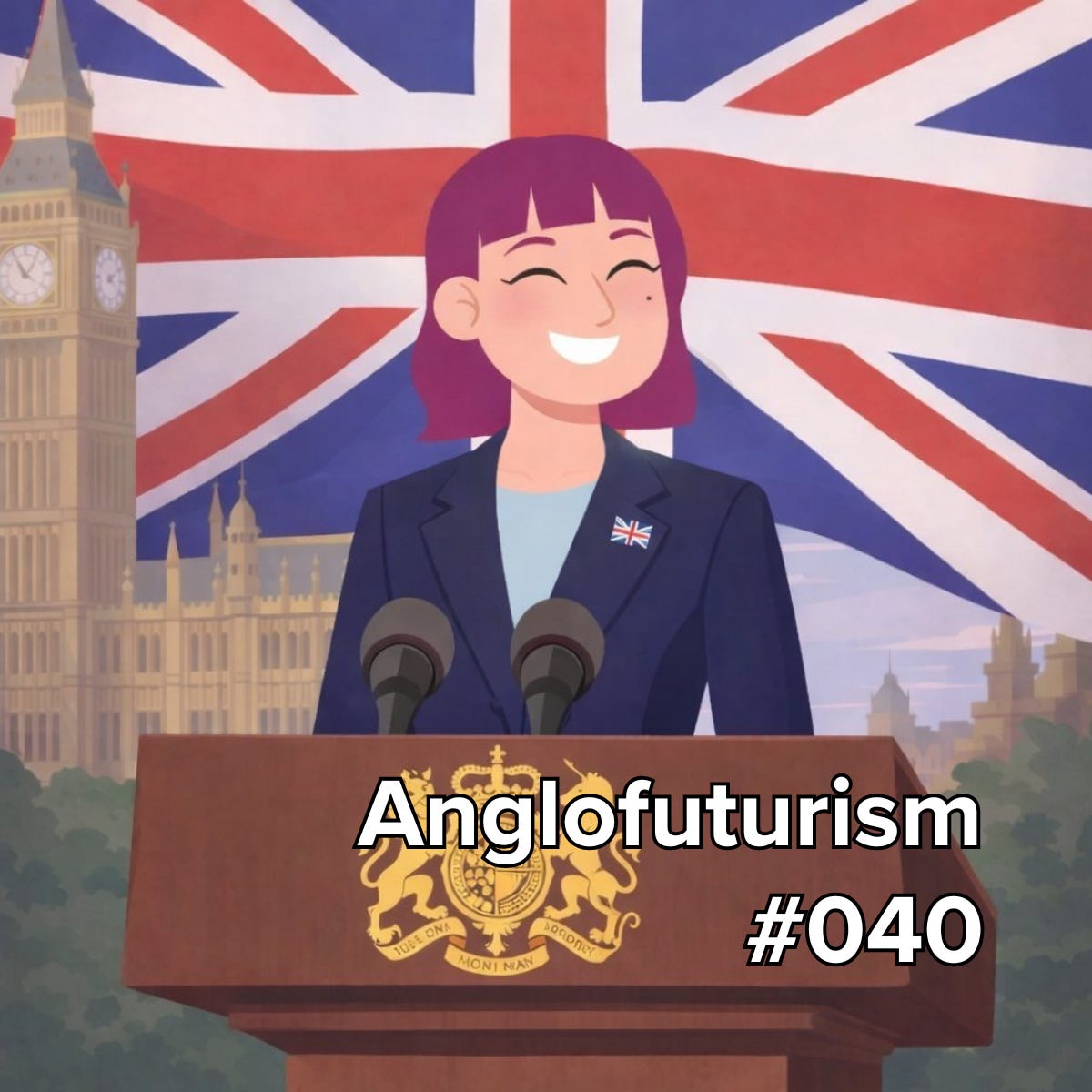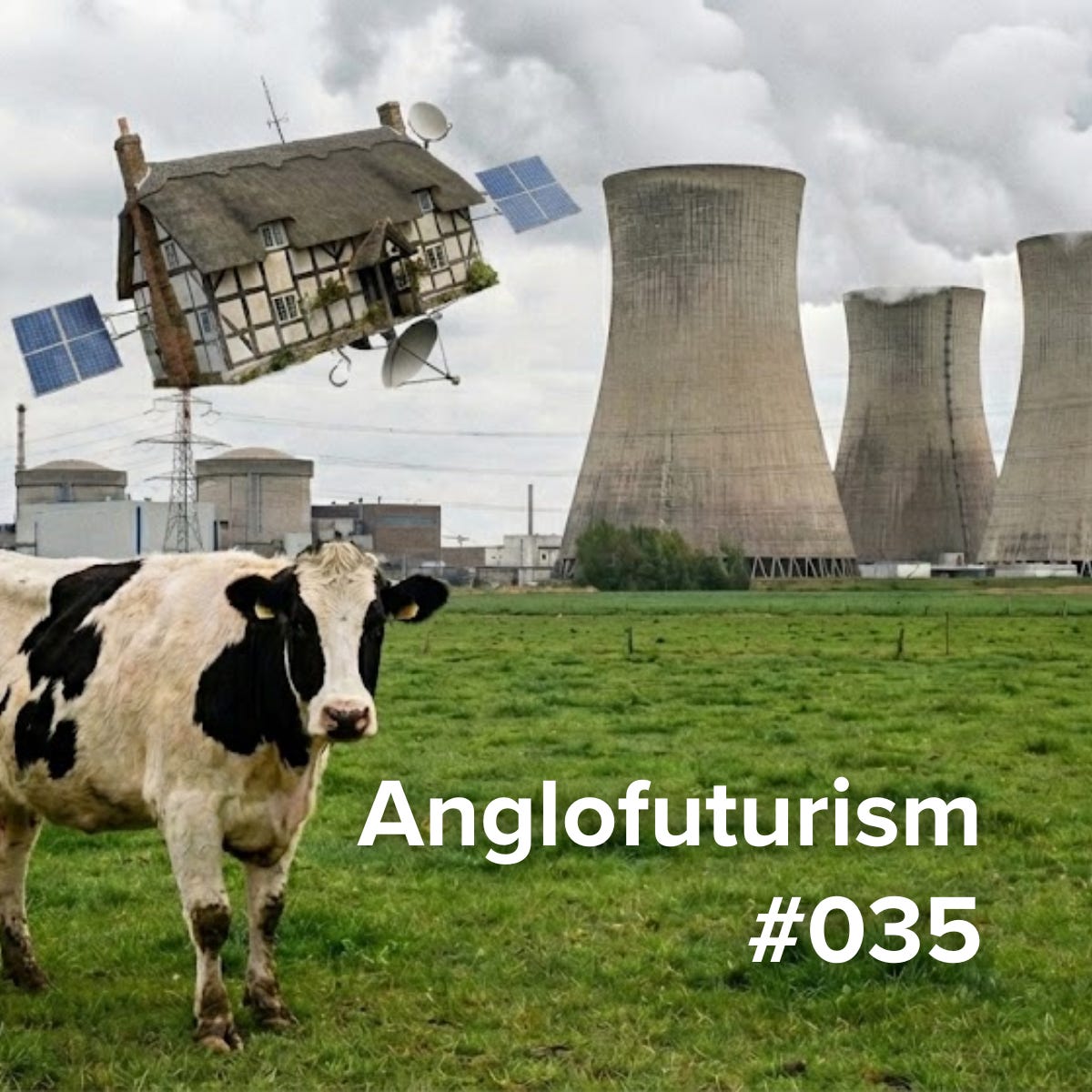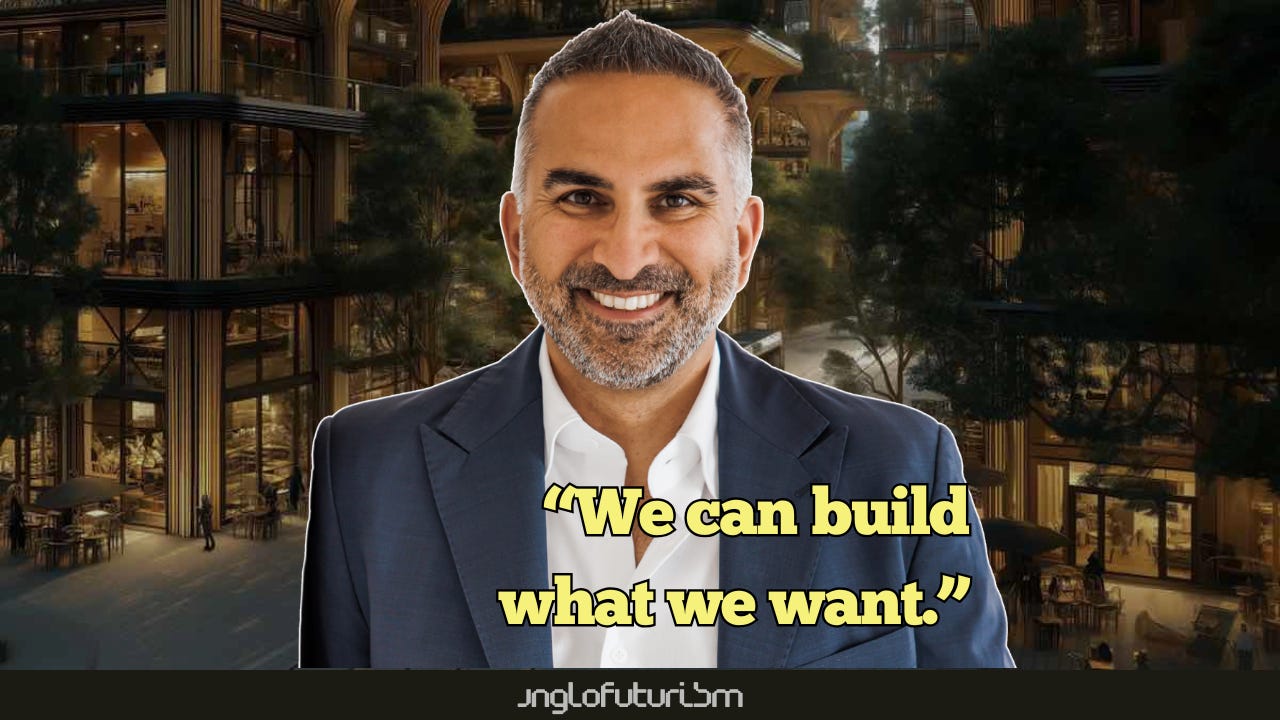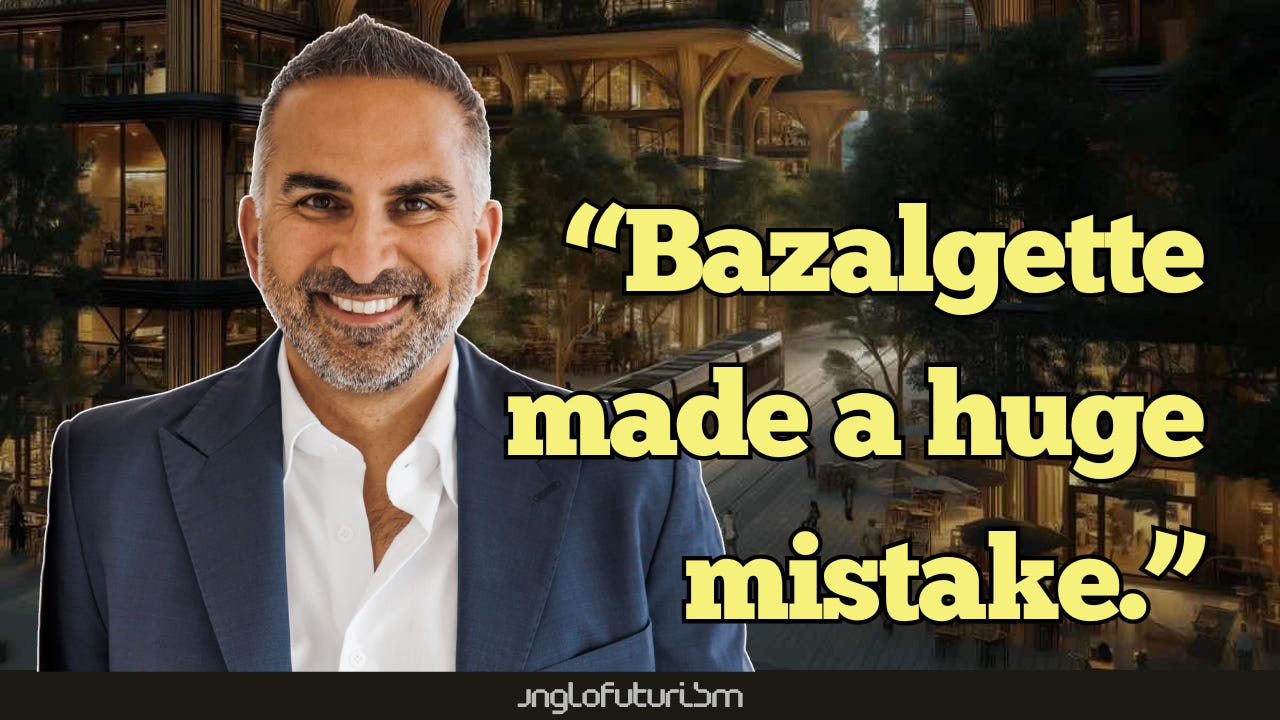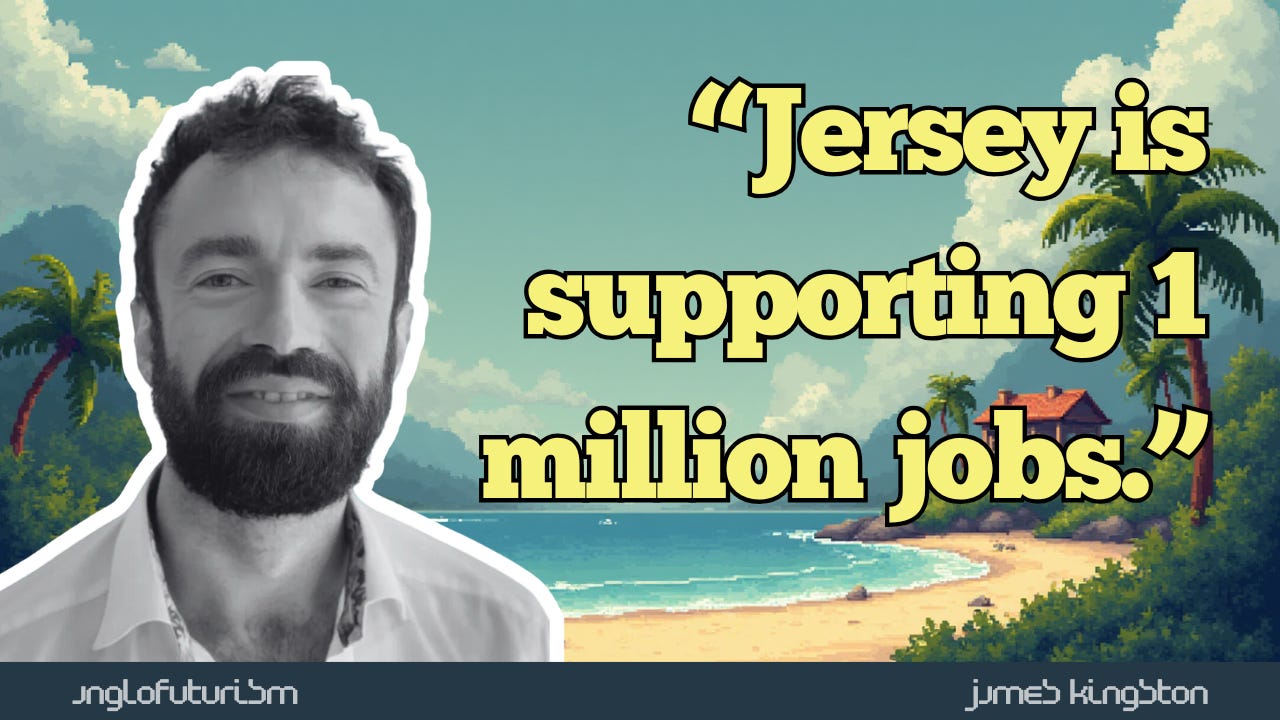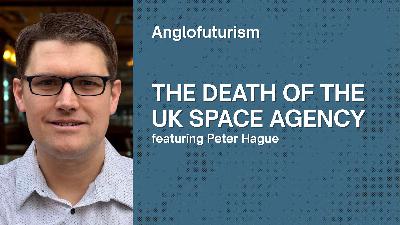Discover Anglofuturism
Anglofuturism

Anglofuturism
Author: Tom Ough and Calum Drysdale
Subscribed: 47Played: 960Subscribe
Share
© Anglofuturism Podcast
Description
Who now has anything to say about the deindustrialisation of this country?
Georgian townhouses on the moon. The highest GDP per capita in the Milky Way. Small modular reactors under every village green.
This is Anglofuturism. Hosted by Tom Ough and Calum Drysdale.
www.anglofuturism.co
Georgian townhouses on the moon. The highest GDP per capita in the Milky Way. Small modular reactors under every village green.
This is Anglofuturism. Hosted by Tom Ough and Calum Drysdale.
www.anglofuturism.co
40 Episodes
Reverse
In our first episode of 2026, we’re back aboard the King Charles III Space Station to review the year that was and set our ambitions for the year ahead. What follows is two hours of sprawling conversation about dinner party politics, whether culture can emerge from hinge, the declining willingness to fight wars, Chinese peptides, home counties baby girls, and why Britain’s irrelevance might actually be our greatest strategic advantage. Plus: would any of us actually sign up to fight? What defines an existential threat? And is Tom finally going to get married?Tom, Calum, and Aeron discuss:* Dinner party theory of politics and why it causes decline: Our legislators aren’t very intellectual, so they’re strongly affected by what other elites think. They don’t want legislation that embarrasses them at dinner parties. This creates consensus-seeking that produces median outcomes. When power is diffuse, people stay strictly in line. But give them confidence and they’ll act outside the distribution,* The LFG question: Can you change Britain through charismatic campaigning and elite support? Or do you need deeper institutional power? Lawrence Newport had success with the bully campaign, but what’s next?* The Green Belt debate: Tom argues for preserving culture. Calum argues culture and market efficiency are at odds—prioritizing abstract goals while people suffer is like hammering screws into washing machines. The synthesis: build on it, but make it beautiful. “Culture will happen anyway. People want to talk, innovate, meet. The fruits will follow.”,* Would we fight for Britain?: Tom: “If it was existential, of course.” But what counts as existential? Do they have to be in France? We’ve become shielded from risk. In the Falklands, HMS Sheffield caused huge outcry. Russia’s tolerance vastly exceeds ours. “It’s difficult to fight a war if you can’t lose any troops.”,* The HCBG (Home Counties Baby Girl) problem: Silicon Valley has ABGs. We need HCBGs to fill this role in Britain. Core features: Whispering Angel, Barbour with cartridge pockets, drives the will to power in British founders,* The space vision: There’s a clear tech tree: cheap energy → compute + manufacturing → space. “Britain should be doing everything it can to get to space as the new frontier.” As more mass becomes accessible in space vs Earth, your country’s starting size becomes irrelevant—it’s purely about timing. “I really believe Britain should be the wealthiest country in the galaxy.”,* Why Britain’s irrelevance is our advantage: US and China are locked into war. Like European land wars during our Industrial Revolution, they’re tied up while “we can focus on ourselves. Self-care.” We’re passing into irrelevance and that’s a blessing—we can build while they fight,* Aeron’s child prodigy plan: A forecasting outfit put 80% on emergence of a child with “heretofore unforeseen powers” in 20 years. Aeron has the criteria: speaks 4-5 languages, Grandmaster chess by 18, Math Olympiad medal. “He won’t be able to tie a shoelace. Very aristocratic.”,* Tom’s dating Calendly: The plan for HCBGs to book dates with Tom. An AI evaluates your Pinterest—how many Bath stone houses? What’s your Emma Bridgewater pattern? “Show me your Aga abundance, your Barbour jacket abundance.”,Plus: Muscular Anglofuturism returns (six kilos of muscle minimum), sending a space Aga into orbit, teaching humanities bluffers to build drones, chicken wine discourse, and why reading is literally elitist now.Full 2026 kickoff out now. Go forth, conquer, multiply. This is a public episode. If you'd like to discuss this with other subscribers or get access to bonus episodes, visit www.anglofuturism.co/subscribe
In the second half of our Christmas special aboard Theatreship, Tom and Calum welcome Benedict Springbett (the railway man working to give London a better network than Paris) and Aeron Laffere (our producer, who’s raising Britain’s birth rate one child at a time while building coordination technology). What follows is a deep dive into Coasian economics, the decline of English composers, and why Aeron believes Brian Eno is one of Britain’s greatest artists for composing the Windows 95 startup sound.Benedict reveals his plan to build five new Crossrail lines (one more than Paris) that can pay for themselves through housing development. Aeron explains palendr, his project to reduce coordination costs and help people form communities beyond just shagging and drinking. And we learn that the optimal amount of Christmas cracker explosions is greater than zero—perhaps significantly greater if you’re allowed to fire Roman candles at annoying relatives.Tom and Calum discuss with Benedict and Aeron:* Six Crossrail lines to beat Paris: Benedict’s working on giving London a total of six cross-city rail tunnels (five more than we have). The Old Castle Line would be just 5km of tunnel to join north and south of the river, relieving the Northern Line. Crossrail 2 would connect Clapham Junction to King’s Cross/Euston, serving both with one 250m train,* Britain’s secret railway blessing: We inherited 12 separate railway termini because 19th century companies refused to cooperate and just grabbed territory from each other through “cutthroat capitalism at its most ruthless.” Now we can join them up with relatively short tunnels,* The F1 supply chain is a national treasure: Germany doesn’t have it. When German customers ask Isambard about lead times for exotic materials, they’re confused that the answer is “hours not weeks.” The F1 industry created material stockholders who can deliver overnight because Grand Prix engineers need new parts immediately,* The pewter tankard with a glass bottom: Benedict’s Christmas gift—historically used to check if you’re being press-ganged into the Royal Navy by spotting a coin in your drink. Calum plans to use it to avoid doing the washing up,* Coasean Christmas: The problem of pollution is reciprocal. A noisy pub imposes costs on neighbors, but if neighbors stop the pub being noisy, they impose costs on the pub. Either way, somebody pays. The solution: bargaining. The pub could buy out the High Court judge who got the beer garden shut at 7pm,* Aunt Margaret’s Mariah Carey problem: Should Gerald compensate Margaret for loss of festive atmosphere when he demands she stop playing “All I Want for Christmas” on repeat? Or vice versa? Benedict suggests putting a baby in the room—won’t mind the music, Margaret doesn’t feel lonely, Gerald escapes,* The optimal amount of fire is greater than zero: Benedict argues we shouldn’t worry about Christmas cracker externalities. We have far fewer fires than we used to (because no more open fireplaces). Calum wants Roman candles he can fire across the table at annoying relatives,* Why palendr exists: Aeron and a friend met through Anglofuturism built a machine for eliciting preferences using embeddings and vector maths. It’s like “Hinge meets Palantir”—you answer prompts, the system extracts meaning, puts you in a space where similar people and events are “a short hop mathematically”,* The coordination tax: Groups in this space keep independently building dashboards, duplicating work. The British progress community formed partly through high-agency people and big Schelling points, but “those constraints don’t scale.” Lower coordination costs = more communities = more people organizing toward something better,* Why in-person matters: “It’s hard to really grok how another person thinks until you spend quite a bit of time with them, probably over a couple of pints.” Once you have a mental model for how someone sees the world, you can predict their thinking—”that just oils the wheels so much more easily”,* Britain’s club tradition is our secret weapon: Medieval European rulers required permission from the king to form associations. England didn’t, which is why we could easily create the London Stock Exchange, cooperative movement, working men’s clubs, private members clubs. “The spirit is still there even though people do it quite a lot less”,* Blackballing is good actually: Open invite policies risk “one person comes along and ends up causing a lot of drama.” Having members proposed and seconded, with ability to blackball, keeps things open while maintaining quality. Getting people to pay also forces commitment,* Why England has no great composers: The center of gravity was continental for centuries. By the time British royalty could be patrons, fashion was for French and German things. Victorian composers like Vaughan Williams and Elgar? “Not one of them wrote a symphony to the steam engine.” They’re guilty men of history for pastoral fantasies during the Industrial Revolution,* Brian Eno is Britain’s greatest modern composer: Progenitor of ambient music, understanding that music would become “like wallpaper” long before streaming. But critically: he composed the Windows 95 startup sound. “To compose a three second piano ditty that plays every time you turn on your computer, I think is wonderful”,* Thomas Tallis gets the other vote: “The basis for all music should come from vocal music” and “the early English choral tradition is just stunning. There is absolutely nothing in the world which holds a candle to it.” Unfortunately Spem in Alium is now associated with Fifty Shades of Grey,* The great work is dead (except in cinema): No one does the big impressive novel anymore. Cinema retains the auteur because it has scarcity—you must sit down to enjoy it. But books and music? Too much supply, not enough consumption. “We’re in a post-literate society.” Sally Rooney explicitly retreats from the concept of the great work,* The text auteur is the great tweeter: If text has become background noise, then the person who’s mastered the medium where text is most engaged is the Twitter poster. “There are great tweets that sit and reminisce.” Calum is “struck by reading someone’s jpeg of a dril tweet”,* Benedict’s 60-second triumph: “I’m on a train heading from London up to Glasgow. It’s a maglev.” Proceeds to describe immaculate connections, restored Beeching lines, freight trains carrying British Antarctic Territory ores to Northwest factories, punctuality matching Switzerland and Japan. “Nobody complains about them. They’re no longer a national laughing stock.” Massive applause.Plus: Aeron can identify Tom’s “um” by sight (it’s “a lovely ovaloid”), Calum wants a pre-Columbian Christmas with peacock and pottages shaped like animals filled with the wrong meat, the TOPJAW comparison and who’s more photogenic, and why we need a Tudor-themed restaurant where you eat off bread trenchers and watch a cockfight.If you missed it, go back and listen to Part 1. This is a public episode. If you'd like to discuss this with other subscribers or get access to bonus episodes, visit www.anglofuturism.co/subscribe
Tom and Calum recorded this Christmas special aboard Theatre Ship on the Thames with two guests whose bosses have already graced the podcast: Andrew Kramer from Isembard (the manufacturer re-industrializing the West) and Rebecca Wray from Looking for Growth (the grassroots movement fighting Britain’s decline). What follows is a chaotic celebration of British manufacturing, temperate rainforests, and the extended Anglofuturism universe—complete with a disastrous “Just a Minute” game about life in Britain 50 years from now.We learn that Isembard is scaling from one machine and one camp bed to 25 factories by end of 2026. That Germany lacks Britain’s incredible F1 supply chain (material stockholders can deliver exotic metals in hours, not weeks). That Rebecca waded through a mysterious Oxford rubbish pile in white trainers for content. And that the entire progress community is coalescing into something that might actually save Britain—if they can avoid getting arrested or bogged down in debates about rewilding the Peak District with stunted oaks.Tom and Calum discuss with Andrew and Rebecca:* The Isembard explosion: From one Park Royal site with one CNC machine to four factories (soon to be 25 by end of 2026), expanding into the US and potentially continental Europe. They’re moving beyond precision machining into assembly, sheet metal, and other manufacturing methods,* Why Britain’s F1 supply chain is a secret superpower: German customers ask Isembard how many weeks they factor in for raw materials. The answer? Hours. The F1 industry created a hub where money is no object and parts need to be ready overnight—which means Britain has material stockholding for exotic metals that Germany simply doesn’t have,* The Oxford rubbish pile mystery: Someone got arrested. Rebecca went to investigate in white trainers. It was wet, soggy, disgusting, possibly council waste (needs more investigation). The important thing is LFG got there fast and got footage,* “Designed by Apple in California, Made in China” was always a fallacy: Andrew argues you cannot separate design and manufacturing—the embedded tacit knowledge in the manufacturing process is integral to innovation. This is why we’re going to make iPhones in Britain,* The average machine shop owner is nearing retirement: Decades of underinvestment and outsourcing to China hollowed out British manufacturing. But there’s cause for optimism—young apprentices are now running successful factories. Isembard’s Exeter GM started his apprenticeship just five years ago,* Defence as the wedge: Re-industrialization is easier in defence because there’s an obvious need for sovereign production. But it’s not where you finish—Isambard is already doing consumer parts. The goal is total re-industrialization across all sectors,* Culture is downstream of decline (and upstream of revival): Rebecca argues Britain is stuck in a “doom loop” and needs a cultural reset about what we want the future to look like. Andrew says reindustrialisation is downstream of telling positive stories about British manufacturing—F1, electronics, the incredible companies already doing extraordinary things,* Rebecca wants to rewild England: Specifically with temperate rainforests. She’s from the Peak District and is a moss and fern aficionado (”ferns are really prehistoric plants”). Calum: “Sorry to realise you’re a Natural England plant.” The ingredients for rebuilding Britain: moss and metal,* The Jacquard loom question: Calum was talking with friends about building a Jacquard loom (early programmable looms with punch cards that inspired Babbage and Lovelace). He got shouted down—”No, we should build drones instead.” Russians coming over the horizon > nice fabric,* LFG’s origin story: Rebecca met Lawrence two years ago during the Bully campaign and thought “this is what’s been missing—very focused campaigns that highlight why things are so f*****g wrong.” She went to the first LFG meetup, got asked to do a podcast, said no initially, then said yes,* The extended Anglofuturism universe is real: Everyone at LFG events knows each other. There’s a genuine community forming between LFG, Anglofuturism, and others. It’s becoming a coordinated movement rather than isolated initiatives. “I think we’ve got a good chance to save Britain.”,* Isembard needs your entrepreneurial engineering friends: They’re hiring and recruiting heavily. Send your drawings and step files. They can do thermoplastics, exotic materials, titanium radar-absorbent Antarctica models if needed,* The disastrous “Just a Minute” game: Andrew manages 20 seconds describing flying taxis and lab-grown Full English breakfasts in his Georgian townhouse on the moon. Rebecca gets to “I see the bright lights of Chesterfield” before repeating “Leeds” twice. Tom delivers a masterclass: thatched orbital space stations, English wool pyjamas, bangers and mash in microgravity, billowing smoke from Northern chimney stacks, and the Shackleton Colossus in British Antarctic Territory.Plus: Why Aeron should bring a soundboard to live recordings, why the podcast is “quite camp actually,” the mystery guest who messaged at 4:37am to say he wasn’t in a suitable condition, and Calum’s Druidic ritual of reawakening these Britannic majestic isles (before immediately eliminating himself for repetition).Part 2 coming soon. Let’s f*****g go. This is a public episode. If you'd like to discuss this with other subscribers or get access to bonus episodes, visit www.anglofuturism.co/subscribe
In part two of our conversation with James W. Phillips and Laura Ryan, things get weirder and more ambitious. We move from the structural problems of academia into the actual scientific missions these labs could pursue—from cells-as-agents to neuromorphic AI to using brain organoids as compute. James reveals his plans to spend January investigating whether Zen meditation practices can tap into healing mechanisms through the gut-brain axis, and Laura makes the case for massive automation in biology.The conversation also gets into the hard questions: Can you really trust taste over metrics? Would philanthropic funding create the same perverse incentives as multiple stakeholders? How worried should we be about engineered pandemics? And is Britain’s ossification just an inevitable consequence of having too many old people?Tom, Calum, James and Laura discuss:* The missions Lovelace Labs could tackle: Drugging disordered proteins (proteins without fixed structures that current methods can’t target), bacterial learning and intelligence at the cellular level, neuromorphic AI that actually models the brain properly, and using brain organoids as biological compute,* Why biology needs massive automation NOW: Laura describes spending a quarter of her PhD time creating gels, running things through gels, analyzing bands—work that should obviously be automated or done by centralized facilities with shared reagent libraries. But academia won’t drive this transition because PhD students are “free labour” to professors,* Calum’s bacterial learning pitch: He wants to build large automated facilities where biologists can upload scripts, run 1,000x more experiments, and get results same-day instead of doing manual pipetting,* The AI integration question: Will AI empower scientists to do more creative thinking? Or create a dystopia where humans are “meat robots” moving plates between machines because it’s cheaper than automation, while hypothesis-generating LLMs compound existing replication problems?,* James’s Zen Buddhist science project: Starting January, he’s investigating whether embodied meditation practices can tap into healing mechanisms through the mind-body connection. He spent time in Zen monasteries and thinks new tools can finally probe these questions scientifically,* Body waves are the new brain waves: Virginia Rutten engineered zebrafish cells to fluoresce when active, then recorded every cell in the body—revealing waves of coordinated activity we’d never seen before. James thinks mystery conditions might involve deficiencies in these body waves, just like we talk about brain wave disorders,* The vagus nerve revolution: You can now turn on just the specific vagus nerve branch that innervates one particular organ using tools from neuroscience. Physiology—declared “dead” in 2011—is being rejuvenated the way neuroscience was 20 years ago,* Tom Forth’s geographic critique: Are you just sloshing money around the Southeast? Laura responds that scientific excellence must guide location, but there are bright spots elsewhere—Lee Cronin’s automated chemistry lab in Glasgow, Liverpool’s work. The problem is London policy bubble can’t see beyond the Golden Triangle,* ARIA nearly died before it began: Treasury tried rolling back agreements after the misfits left. James Price saved it by ensuring everything went to the Chancellor’s desk—meaning they could write the reply. On Boris’s last day, the official advice was “wait months for a business case.” Nadhim Zahawi: “I’ll take the unprecedented option.”,* Boris on quantum computing: “James, I’ve still got no idea what a quantum computer is, but I love it.” He’d punch his hands in the air whenever he saw James: “Science superpower, build back better!”,* The engineered pandemic threat: It’s become “a lot easier to artificially create pandemics and the number of people you would need to do it is trending towards one quite fast.” James was in meetings where officials said it wasn’t possible—”well here’s a paper from 10 years ago where they did it.” The COVID inquiry is “not fit for purpose.”,* The demographics doom loop: Are Bell Labs and LMB only possible when boomers were the right age? Now we have more old people than ever, listening to the Rolling Stones forever, blocking all institutional change. James: “In my more cynical moments I wonder if we’re pushing against fundamental civilizational trends toward bureaucratization.”,* Tom’s solution: “We have to shag for science, basically.” Silence from across the table.Plus: Why methods papers are poorly cited despite being more important than discovery papers, why the Dalai Lama’s one paper will win an instant Nobel Prize, James almost becoming a cave hermit instead of fixing British science, and Stefan Roberts’s vision of “the UK as an R&D lab with an economy attached.” This is a public episode. If you'd like to discuss this with other subscribers or get access to bonus episodes, visit www.anglofuturism.co/subscribe
James W. Phillips and Laura Ryan are former neuroscientists who’ve written a proposal to save British science by basically blowing up the university system. Or at least building an alternative to it. Their diagnosis? The best scientists they know have all quit academia—not because they failed, but because they succeeded and realised the game is rigged. The incentive structure rewards safe, incremental research that gets published quickly rather than ambitious, years-long projects that might actually change the world. Frederick Sanger won two Nobel Prizes while publishing three papers in 20 years. Today he’d never get tenure.Their solution is Lovelace Labs—a network of institutions modelled on Bell Labs, Xerox PARC, and the Cambridge LMB, where scientists would be core-funded for 15 years, assessed internally by colleagues who understand their work, and freed from the tyranny of grant applications and citation metrics. Where engineers work alongside theorists, where 30-year-olds run labs instead of spending a decade as research assistants, and where the founding director gets told by Number 10: “Here’s your money, we’re not going to mess around.”Tom and Calum discuss with James and Laura:* Why the smartest scientists quit: Laura’s smartest friend from her Cambridge PhD—someone who always wanted to be a scientist—left because the system is fundamentally unfair. James’s entire cohort of rising stars, the people doing work featured in the New York Times, have all left academic research except one,* The replication crisis stems from broken incentives: Foundational Alzheimer’s research papers were fraudulent for 25 years because everyone benefits from piggybacking on existing results rather than exposing problems. Brain imaging studies lacked statistical power but it took 20 years for that to become common knowledge,* Leo Szilard’s 1948 prophecy: He wrote a satirical story about a wealthy man who wanted to slow down science, so he invented peer review—pulling scientists out of labs into administration and forcing everyone to work on ideas that three peers would approve, killing all unusual fresh shoots,* Peter Higgs couldn’t survive today: He published sparingly over 20 years, doing deep work that eventually won a Nobel Prize. Today’s system demands papers every six months with positive results—negative data is considered “time wasted” even if it’s exemplary science,* China has overtaken us on neuroscience: Nine of the top 10 institutions in leading journals are now Chinese (it was two five years ago). Their packages to recruit talent: “Come over, we’ll give you your own lab, strong core facilities, hire whoever you want.” The UK’s pitch: “But we have Oxford!”,* The Number 10 science establishment blocked honors: During the pandemic, two researchers (Bonner and Kataraman) created the rapid testing program with modeling that proved crucial. The science establishment blocked their honors and gave them instead to senior people who’d been blocking the rapid testing program,* Alan Kay was 30 at Xerox PARC: When James asked him about top-down direction, Kay revealed he was the oldest person there at 30. In the UK, these people would still be postdocs working as research assistants. Demis, Dario, Sam Altman—all in their 30s when founding DeepMind, Anthropic, OpenAI,* Max Perutz’s recipe for great science: “No politics, no committees, no reports, no referees, no interviews—just gifted, highly motivated people picked by a few people of good judgment.” The Cambridge LMB followed this and produced Nobel Prize after Nobel Prize,* The UK over-indexes on universities: We rely more heavily on the university department model than almost any other advanced science nation. Germany has Max Planck and Fraunhofer. America has DOE labs and tech company research. We have... more universities in Midlands towns acting as jobs programs,* Westminster ejects the misfits: James was part of the Cummings misfits experiment. As soon as key supporters left Number 10, the team began leaving. The Vaccines Task Force was crushed, the data science unit repeatedly attacked. Two of Labour’s three great appointments—Matt Clifford and Poppy Gustafsson—have already left. This is a public episode. If you'd like to discuss this with other subscribers or get access to bonus episodes, visit www.anglofuturism.co/subscribe
This is a free preview of a paid episode. To hear more, visit www.anglofuturism.coTom and Calum dissect John Fingleton’s damning nuclear regulatory review, play Sacred Cow with the greenbelt and Zone 1 council housing, and explain why Shabana Mahmood’s “tough on immigration” reforms are actually quite soft. Plus: nuclear policy specialist Robert Boswall drops by fresh from the pub to explain why the ONR reports to the Department for Work and Pensions, and why Birmingham City FC’s new chimney-adorned stadium might be the most important piece of architecture in Britain.Tom and Calum discuss:* The Fingleton nuclear report: Santa came down the chimney with a huge sack of regulation-cutting proposals—£700 million fish discos, eight different regulators for defence projects, and the revelation that civil servants defer to regulators who defer back to civil servants in an endless loop of inaction,* Robert Boswall’s pub celebration: Fresh from carousing over the nuclear report, nuclear policy specialist Robert Boswall explains why tolerability of risk matters, why the ONR bizarrely reports to the Department for Work and Pensions, and why his favourite regulation to abolish is “regulatory justification”—a random EU inheritance that costs millions and achieves nothing,* Sacred Cow carnage: Calum slaughters the greenbelt (”most of it is disused petrol stations”), executes Zone 1 council housing without hesitation, but spares Christmas and national parks. Tom meanwhile shows his kindness towards farm animals,* Shabana Mahmood’s immigration mirage: Blue Labour are delighted by her “tough” reforms—20-year wait for asylum seekers!—but there are carve-outs everywhere (jewellery confiscation exempt if “sentimental”), new safe and legal routes opened up, and asylum seekers can choose the 10-year track instead. Chris Bayliss in The Critic calls it out as vibes over substance,* Elite defectors and vibe shifts: Tom argues that Westminster consensus on immigration is cracking and elite opinion is shifting against mass migration. Calum counters that this means nothing if Reform sweeps in on northern Red Wall seats while London dinner parties stay the same,* Birmingham City FC’s chimney stadium: Thomas Heatherwick’s design with 12 enormous brick chimneys evoking Birmingham’s industrial past. Tom loves it as history finding echo in architecture. Calum worries it’s pastiche—until Tom destroys him with facts and logic about Houses of Parliament crenellations.
In the second part of this conversation, Shiv Malik goes deeper on why millennials never organised around housing despite it being the defining material issue of their generation. His book tour for Jilted Generation in 2010 drew audiences full of chest-beating boomers—but almost no millennials showed up. Was it that they saw housing as a personal failure rather than a systemic one? That complaining about rent wasn’t intellectual enough for degree-educated people who’d read theory? Or has social media created weak bonds and the illusion of political action through likes?In the second half of this two-part conversation, Shiv, Tom, and Calum discuss:* Why millennials never protested housing: Shiv’s book tour drew boomers who either self-flagellated or accused him of wanting them dead, but almost no millennials—possibly because rent isn’t intellectual enough for degree-educated people who prefer causes with “great bodies of theory,”* The cavalry isn’t coming: a major decision-maker told Shiv that building a city “is not the kind of thing we could do in 21st century Britain” and asked where his generation’s protests were—because politicians would act if young people actually demanded housing,* The social contract, not cities: Shiv doesn’t only care about cities—he cares about restoring the promise that if you work hard you can buy a house and raise a family. The city is just the only vehicle that might get past all the NIMBYs,* Development corporations as tools: the Olympics legislation took nine months and had spades in the ground within 18 months. HS2 failed because it had to negotiate bat tunnels with every parish along the route,* The aesthetics problem: how do you bring back decoration without being slavish to the past? Charles Rennie Mackintosh and Art Deco represent the last moment of both futurism and ornamentation before the brutalists threw out decoration entirely,* Manufacturing charm: Richard de Haan transformed Folkestone by renting to creative businesses at peppercorn rates. But can you manufacture what 220-year-old London pubs have imbued into their fabric, or does it just happen? This is a public episode. If you'd like to discuss this with other subscribers or get access to bonus episodes, visit www.anglofuturism.co/subscribe
Shiv Malik is the would-be founder of Britain’s first new city in over 50 years. He and Joe Reeve from LFG have identified 45,000 acres east of Cambridge for a million-person city, complete with cross-laminated timber skyscrapers, trams, proper sewerage, and enough infrastructure that NIMBYs might actually be won over by three new hospitals and 300 schools appearing on their doorstep.In the first of this two-part conversation, Shiv, Tom, and Calum discuss:* The vision: a pedestrianised city centre with wooden skyscrapers reaching 60 storeys, trams running through it, and sewerage done right for once—plus all the ideas that can never be retrofitted into Victorian streets,* Why Milton Keynes is Britain’s secret productivity miracle: it’s the most productive place outside a few London boroughs, and if everyone lived as richly as Milton Keynes residents, we’d be 50% richer as a country—not because of roundabouts, but because recently-built infrastructure is simply more efficient than Victorian stairs,* The stakeholder nightmare: West Suffolk Council met Shiv for 90 minutes, Lord Vestey owns a third of the land, 8,000 current residents need convincing, and the development corporation model that built Milton Keynes in six weeks of public consultation is now viewed as dangerously autocratic,* Why NIMBYs have a point: the houses are terrible, there’s never infrastructure with new developments, Section 106 bargaining is an irrational barter system, and people are right to oppose ugly pylons and Barratt Homes extensions that crater village life without delivering train stations or hospitals,* The intergenerational thesis: Britain created a new leisure class that never existed in human history—retirees with incomes equal to workers but derived from capital, not labour—and they have time to dominate local politics while exhausted workers can’t fill out planning responses at 9:30pm,* The Boriswave outrage: Shiv gets told to “go home” online and understands why people are angry. He agrees with Shabana Mahmood that immigration policy has been a total failure—but why haven’t we built a reservoir in 30 years, and why doesn’t Haverhill have a train station? Immigration didn’t cause those failures,* The cavalry isn’t coming: Baroness Claire Fox asked Shiv if his book was “just a giant whinge,” and she was right—millennials and Gen Z protest about Palestine but don’t organise around material circumstances like housing, which is why Joe Reeve’s “we are the cavalry” moment convinced Shiv to dust off his old city plans,* The economics: community land trusts for housing, special economic zone tax breaks like Canary Wharf for commercial land, 80 acres in the city centre for ACDC (Albion City Development Corporation) to capture uplift, and the precedent of the Docklands Development Corporation proving this model works,* Phase one goals: convince Housing Secretary Steve Rayner to greenlight the development corporation, raise £200 million for master planning and site surveys, get spades in the ground by the end of this Parliament, and prove to Lord Vestey that selling up (or investing) beats getting CPO’d. This is a public episode. If you'd like to discuss this with other subscribers or get access to bonus episodes, visit www.anglofuturism.co/subscribe
James Kingston works in the digital asset industry and is the author of Profitable Peripherals: Maximising the potential of British CDOTs. He came aboard the KC3 to explain why the Cayman Islands, Jersey, and Britain’s 17 overseas territories aren’t tax havens draining the exchequer—they’re innovation labs pumping foreign capital into British banks and employing British lawyers to service Chinese deals.James, Tom, and Calum on:* Why the narrative that CDOTs are a “shadow empire for British finance” draining tax revenue is measurably wrong—Jersey alone supports a million UK jobs annually through £1.4 trillion of intermediated capital, and 68% of deposits in Jersey banks flow back to Britain despite only 29% coming from the UK,* The comparative advantage problem: 70% of the world’s hedge funds are domiciled in the Cayman Islands ($2.7 trillion, more than the US), and 66% of British Virgin Islands assets concern Greater China deals—meaning British lawyers in London tax revenue from Shenzhen transactions they’d never otherwise access,* Why these jurisdictions succeeded where hundreds of other offshore centres failed: international investors trust the common law system and know that if something goes wrong, they can ultimately rely on London—but if Britain ever seized the money (as one MP proposed to fund the NHS), the entire edifice would collapse overnight,* The innovation case: Jersey passed data trust laws, the Isle of Man is releasing Data Asset Foundation legislation, and the Cayman Islands created legal structures for DAOs—Britain should partner with CDOTs as regulatory sandboxes for tech rather than just finance, creating British jobs in data stewardship and AI development,* Why the “finance curse” criticism—that Britain’s best minds waste their lives writing tax-efficient contracts rather than founding energy startups—is the most compelling argument against CDOTs, but also why abandoning comparative advantage in pinstripes would be economically illiterate,* The security question: can Britain actually defend these territories in a multipolar world, or should we follow Philip Cunliffe’s argument that claiming places you can’t defend is a fiction? James says giving things up willy-nilly (looking at you, Chagos) isn’t the answer—economic activity strengthens claims, like the East India Company did,* The vassalisation problem: Britain spent decades being completely open to the world, but CDOTs are really nodes in a US financial imperium—British tech stacks run on American platforms, and conflating US interests with British interests means we’ve forgotten to ask what independent leverage looks like,* James’s 50-year vision: British spaceships launched from Ascension Island, Jersey-domiciled mining outfits in the Oort Cloud, interstellar cargo ships flagged with the Isle of Man, and Britain remaining in the top tier of nations with trillion-dollar companies built here rather than accepting managed decline as a “normal European country.” This is a public episode. If you'd like to discuss this with other subscribers or get access to bonus episodes, visit www.anglofuturism.co/subscribe
This is a free preview of a paid episode. To hear more, visit www.anglofuturism.coDon’t forget to sign up for November’s Anglofuturism meet-up in London. Check the blog for more information.After being featured in both a Hope Not Hate hatchet job and a New Statesman meditation on “British hüzün,” Tom and Calum defend their vision against critics who keep mistaking them for nostalgic romantics when they just want Britain to build factories again. Plus: why the first castle built in Britain for a century looks like a multi-storey car park, ARIA’s remarkable success at funding cutting-edge science, and Matt Clifford’s case that Britain simply needs to be wealthy again.Tom and Calum on:* Why every critic keeps describing them as Young England romantics wandering gothic landscapes when they actually just want factories—as Rian Whitton put it, they don’t want Blake’s New Jerusalem, they want the dark satanic mills (ideally both),* The castle problem: Britain’s first castle in 100 years has been built and it’s absolutely hideous—a Grand Designs disaster with PVC windows that cost £7 million, proving you cannot trust architects or educated elites to have your interests at heart,* ARIA’s golden period: why Britain’s Advanced Research and Invention Agency is successfully funding AI scientists, programmable plants, and self-driving labs whilst selecting genuinely brilliant people—plus Calum’s application to build biological automation robots that could enable runaway technological progress,* The inevitable NASA-style bureaucratic drift that will eventually destroy ARIA, and why you just have to start new institutions every generation rather than trying to reform sclerotic ones that have lost their edge,* Matt Clifford’s speech at the LFG conference arguing Britain simply needs to be rich again—citing Bradford as once the wealthiest city in the world with a town hall like the Natural History Museum, now a symbol of decades of managed decline and why this message resonated so powerfully,* Why the British right is more right-wing than American Trumpers on national identity (81% vs 65% worry about losing it through immigration) but simultaneously more left-wing on state involvement—the “hang the paedos, fund the NHS” coalition that Reform represents,* The death of noblesse oblige and why modern meritocratic elites are more dangerous than hereditary aristocrats—when status comes from beliefs rather than bloodlines, you get luxury beliefs and educated ignoramuses who haven’t done the reading outside their narrow expertise,* Why people viscerally hate inequality and billionaires now despite billionaires living basically the same lives as us—but in 20 years when life extension and neural modulation are available first to the wealthy, humanity will genuinely bifurcate and make current debates look like child’s play,* Dutch Bato-futurism: the next Dutch PM is promising 10 new cities including one raised from the sea (£20 billion, 60,000 homes), Orbex successfully simulating a rocket launch in Scotland, and China drilling 3km deep into Antarctic ice whilst Britain maps the bedrock then publishes it for everyone,* The Zack Polanski problem: why Britain is producing its own version of Mamdani-style socialist politics, and whether the sovereign individual thesis about elites escaping nations was wrong about the direction of travel in the 21st century.
Don’t forget to sign up for November’s Anglofuturism meet-up in London. Check the blog for more information.Tom and Calum visit Space Solar at Harwell to meet co-founder and co-CEO Sam Adlen, who’s attempting to solve Britain’s energy crisis by putting massive solar arrays in geostationary orbit and beaming the power down as microwaves. No new physics required—just the unglamorous work of becoming the Toyota of space infrastructure.In the episode:* Why space-based solar delivers 13 times more energy than ground panels and provides baseload power 24/7, making it economically competitive with terrestrial solar even at today’s launch costs,* The technical solution: kilometere-scale satellites made of hundreds of thousands of coffee table-sized modules that beam power down using phase conjugation, with no moving parts and power density a quarter of midday sun (safe enough that birds won’t cook),* How Space Solar’s system works like a “giant interconnector in space”—instantly switching beams between countries to balance grids, support renewables when wind dies, and redirect power where it’s needed, potentially saving over a billion pounds annually in UK energy system costs,* Why they’re not trying to invent new physics but rather optimise industrial process—the challenge is manufacturing a million modules, perfecting logistics, and automating assembly in space using robotics that construct truss structures in orbit,* Britain’s fatal flaw: brilliant at innovation, terrible at scaling, with orders of magnitude less investment going into space than AI or fusion despite space being “bigger than AI” and strategically critical as the new waterways for global power,* The regulatory reality: UK space regulators have been “superb” and energised, even on grid connections that normally take 15 years—the real bottleneck is financing early-stage infrastructure rather than venture capital’s preference for low-capex software,* Sam’s vision for 2075: Britain as a leader in space infrastructure, power no longer a constraint, and a generation with genuine abundance ahead—but only if we move now, because “there’s no second mover role” when barriers to entry spike after first movers climb the cost curve,* Why Starship’s success is the step change moment for space: 24 launches in 24 hours transforms everything from orbital data centers to asteroid mining, and Britain needs to commit two orders of magnitude more investment immediately or watch others colonise the economic high ground. This is a public episode. If you'd like to discuss this with other subscribers or get access to bonus episodes, visit www.anglofuturism.co/subscribe
This is a free preview of a paid episode. To hear more, visit www.anglofuturism.coAfter being featured in a Hope Not Hate report linking Robert Jenrick to Anglofuturism, Tom and Calum reflect on their newfound infamy while developing their theory that Pingu represents English settler colonialism, discussing plans to rebuild Britain’s castles, and making the case for British domination of space.Tom and Calum on:* Their appearance in a Hope Not Hate exposé as “the most intellectual vision” of Anglofuturism, despite the organisation’s history of libel cases and treating any immigration scepticism as fascism,* The Straussian reading of Pingu: why the show is clearly about English settlement of Antarctica, with Pingu as a third-generation settler family complete with nuclear family structure and grandparents—”indomitable, curious, restless, resourceful,”* The Pendragon Foundation’s plan to rebuild Britain’s crumbling castles as living cultural centres rather than preserved ruins, learning from French château restoration and Japanese craft traditions that maintain skills through continuous building,* Why buildings must evolve rather than be frozen in amber—the challenge isn’t preservation but having the confidence that new additions enhance rather than damage, avoiding both museum-ification and CBeebies-style vandalism,* Boris Johnson’s continued defence of mass immigration despite acknowledging integration has failed, and why his generation of Tories remains traumatised by the “nasty party” narrative and temperamentally incapable of restriction,* How cultural narratives around immigration and integration have shifted over generations, and why the smartphone age presents challenges for assimilation,* Why no financial incentive can solve Britain’s birth rate crisis when market logic has made children economically irrational, and the grim possibility that medical technology is amplifying fertility problems,* Britain’s new orbital defence sensors against Russian laser attacks, and why now is the moment for some bloody-minded figure to champion British domination of space warfare before the opportunity passes—defending satellites today, commanding the high ground tomorrow.With additional audio from Calum’s appearance on Hugo Rifkind’s Times Radio show and an excellent YouTube clip.
Curtis Yarvin steps aboard the KC-3 to argue that Britain should exploit America’s imperial exhaustion to become the new leader of the West, starting with dismantling the cathedral of unaccountable bureaucrats that has replaced genuine sovereignty. It’s a path that runs through Oxbridge, extraterritorial Chinese Oakland, and possibly some Ayahuasca for Elon Musk.Tom, Calum, and Curtis on:* Why the Deliveroo economy is more dehumanizing than Victorian servitude - with social distance replacing the personal bonds that once connected masters and servants,* How Elizabeth I’s delegation to the Cecils created Britain’s first “deep state” of Platonic guardians, leading directly to today’s unaccountable oligarchy of Sir Humphrey Applebys,* The pornography of democratic power: why voting makes you feel sovereign when you’re actually just a consumer demanding better customer service from an autocracy that pretends to care about your opinions,* Why gain-of-function research is like coming home to find your ten-year-old setting fire to the kitchen curtains “for science” - and how experts’ conflict of interest makes them create the crises they’re paid to solve,* Napoleon’s maxim that “the crown of the Western world is in the gutter” - why Britain can simply pick it up with its sword now that American imperial energy has dissipated and the State Department can’t stop you,* The case for neo-colonialism as win-win: reverse extraterritoriality in West Oakland with Chinese police in white gloves, reclaiming Jamaica and Ceylon’s tropical highlands, and why Africa needs to be “regoverned” before it can thrive. This is a public episode. If you'd like to discuss this with other subscribers or get access to bonus episodes, visit www.anglofuturism.co/subscribe
This is a free preview of a paid episode. To hear more, visit www.anglofuturism.coTom and Calum explore "dark abundance": a more muscular approach to progress that combines deregulation with decisive state action against disorder and dysfunction.* Why Trump's state visit was peak "museum Britain" - bringing out the fine china for foreign guests while using enamelware the rest of the time,* The taxonomy of abundance politics: from Ezra Klein's soft progressivism to "dark abundance", which posits that some people need locking up until their frontal lobes develop,* How special interests capture reform - from civil servants empire-building through risk assessments to public sector workers voting Labour to preserve their comfortable sinecures,* The eternal tension between Manchester Liberal free trade and the need for order: why you can't have abundance without deterring bus fare dodgers and ensuring violent criminals actually face consequences,* Victorian-style pacification of the country through decisive punishment, inspired by Britain executing 16 times more people per capita than Prussia in the 19th century,* Their architectural philosophy for the coming new towns boom: why Poundbury succeeds despite its mongrel-like mixing of styles, and the case for illiberal design codes that ban modernist innovation in city centres until we figure out what the hell is going on in architectural schools.
Industrial policy researcher Rian Chad Whitton makes his second appearance to dissect Britain's manufacturing decline, arguing that energy costs and economic orthodoxy have systematically dismantled what was once the world's fourth-largest industrial base.Tom, Calum, and Rian on:* Why 1999 represented a high-water mark for British industry - the fourth-largest manufacturing base globally with functioning steel, chemicals, and automotive sectors, before China's rise blindsided everyone including FT columnists,* How Britain's "tolerance for lower margins" problem means we exit markets entirely while Germany and Japan fight to stay competitive - illustrated by ICI's dismantling versus Jim Ratcliffe's successful INEOS empire built from the wreckage,* The devastating impact of energy costs on heavy industry: 20% of gross value added for energy-intensive sectors, 80% for steel production, while competitors enjoy massive state subsidies that Britain refuses to match,* Why the government's £51 billion energy support budget (the size of the defence budget) still isn't enough to paper over the fundamental problem of expensive electricity and misguided net-zero policies,* Ryan's fantasy 50-year plan for industrial revival: import substitution for steel and cement, building the world's largest 200,000-ton forge press, and learning from Chinese entrepreneurs who consider profit margins above 5% "economic inefficiency,"* The irony that Britain followed American economic orthodoxy perfectly - green energy, liberal immigration, foreign direct investment - only to be mocked by Americans for becoming a "vassal state" that sucks at everything. This is a public episode. If you'd like to discuss this with other subscribers or get access to bonus episodes, visit www.anglofuturism.co/subscribe
Space policy expert Peter Hague joins from his emergency shuttle to discuss Labour's decision to fold the UK Space Agency into a larger department, effectively ending Britain's independent space ambitions just as the new space age begins.In this episode:* Why the UK Space Agency's absorption into DSIT represents Britain "quitting before it started" - losing budget autonomy and direct ministerial access just when space is becoming strategically crucial,* The historical pattern of British space failures: from abandoning the successful Blue Streak rocket (which could have rivaled Atlas) to the disastrous Europa program where continental partners kept sabotaging British components,* Why the Apollo program wasn't popular at the time but became mythic afterward - and how political leadership means doing unpopular things that future generations will thank you for,* Peter's "Penny for Space" campaign: spending just 1% of government budget on space (compared to 33% on welfare) as a "civilizational pension" for Britain's future in the 22nd century,* The coming space revolution that will make 2029 politically embarrassing: private space stations, Indian human spaceflight, and potentially Chinese or American boots on Mars while Britain has no space program at all,* Why we need a new UK space agency focused on building rotating space habitats in Earth orbit - stepping into the gap as America abandons permanent orbital presence for lunar missions.Peter asked us to higlight the recent work of Progress in building a technology-forward Britain. We recommend trying out the excellent Nick, 30 ans simulator. This is a public episode. If you'd like to discuss this with other subscribers or get access to bonus episodes, visit www.anglofuturism.co/subscribe
Tom and Calum reflect on 25 episodes of the podcast that allegedly influenced Robert Jenrick to declare himself an Anglofuturist, while grappling with accusations of dangerous nostalgia from Southampton academics.Tom and Calum on:* How Robert Jenrick's declaration that he's “what you would call an Anglo-futurist” at a Westminster nationalism conference proves their growing influence* Defending themselves against Francesca Melhuish's academic paper attacking the “nostalgic politics of Anglofuturism”* Why talk of British civil war misses the point - the real question is whether there's a genuine constituency for radical change beyond angry WhatsApp groups and hotel protests,* Tom's new book, and his journey from effective altruist malaria-net maximizer to someone worried about civilizational collapse,* The thrilling prospect of geoengineering our way out of climate change through stratospheric aerosol injection and iron ocean fertilizationThe Anti-Catastrophe League: The pioneers and visionaries on a quest to save the worldA new Elizabethan age: The Advanced Research and Invention Agency (ARIA) and the nostalgic politics of Anglofuturism This is a public episode. If you'd like to discuss this with other subscribers or get access to bonus episodes, visit www.anglofuturism.co/subscribe
Conservative MP Alex Burghart and AI expert Dr Laura Gilbert argue that Britain's mediaeval past holds the key to mastering its technological future–from Alfred's burghs to sovereign data centres.Calum, Tom, Alex, and Laura explore:* How Alfred the Great's response to Viking invasion mirrors today's AI challenge–using crisis as the moment to forge new order when "the metal is hot," creating institutions that lasted centuries,* Why the collapse of Roman Britain offers hope for our post-imperial moment: just as Alfred built something more durable than Rome from chaos, we can create lasting prosperity from current decline,* Laura's insider account of building i.ai within government–attracting world-class talent with the mission to save lives and money, while navigating civil service "antibodies against change" and demands for "Whitehall Sherpas,"* The case for sovereign compute power and data ownership as national security imperatives–why relying on foreign AI models could leave Britain vulnerable to future Donald Trump Jrs turning off access,* Alex's vision for technological Anglo-Saxonism: virtual reality mead halls where the nation's "Witan" assembles annually, plus genetically enhanced oaks growing fast enough to maintain our aesthetic inheritance,* Why the next government needs to break the bureaucratic paradigm that's paralysed Britain since 1990–and why Conservative experience of governmental frustration makes them uniquely positioned to "seize the liquid moment."Sovereignty, Security, Scale: A UK Strategy for AI InfrastructureProfessor James Campbell (historian)Clip from “Harold Godwinson” used with permission from The Skaldic Bard. This is a public episode. If you'd like to discuss this with other subscribers or get access to bonus episodes, visit www.anglofuturism.co/subscribe
Political theorist Philip Cunliffe argues that globalism is dying and Britain has a rare chance to lead the world into whatever comes next - but only if it rediscovers what sovereignty actually means.Philip Cunliffe on:* Why we're witnessing the collapse of globalist political structures that layered transnational governance over democratic nation states,* How ruling elites from the 1980s onwards deliberately fragmented political power to escape working-class demands, creating the regulatory "blob" that can't build railways or defend territory but excels at shuffling PowerPoint decks,* The failure of populists like Trump and Meloni to break free from globalist institutions, despite their rhetoric - and why even "America First" gets sucked back into Middle Eastern quagmires,* Why Brexit was a precocious early move in this global transition, giving Britain unique advantages as other nations will "inevitably have to follow us down as globalism continues to decay,"* The case for "new nations" - not territorial breakups but politically renewed nation-states that can actually defend their interests, requiring proportional representation, ending devolution, and forcing politicians to think in terms of national interest rather than international virtue signaling,* How a revitalised Britain could seize unprecedented opportunities in a multipolar world without a single hegemon - if it's willing to focus on what sovereignty actually means.The National Interest: Politics After Globalization This is a public episode. If you'd like to discuss this with other subscribers or get access to bonus episodes, visit www.anglofuturism.co/subscribe
Dan Tomlinson MP, Labour's official growth mission champion, boards the KC-3 to discuss what Britain needs to sacrifice for economic growth and whether we're still a country capable of big things.Dan Tomlinson on:* Why Britain has lost the ability to do "big and bold" things like the Apollo missions, trapped by endless processes, consultations, and judicial reviews that would make a modern space program impossible,* Testing Labour's growth priorities against various "sacred cows" - from building on the greenbelt (yes) to fracking and North Sea drilling (no) to social housing in central London (complicated),* Whether high immigration helps or hurts growth, arguing that the recent scale (equivalent to adding Leeds, Manchester, Sheffield and Liverpool combined) has unclear benefits for GDP per capita despite official studies,* His three-pillar growth strategy of stability, investment, and reform - particularly planning reform that could add £7 billion to GDP - and why he believes Chancellor Rachel Reeves has the right approach,* His vision for Britain in 50 years.Further readingDan asked us to share this clip of a happier time, when the country struggled under the weight of GP appointments that were simply too easy to obtain: Watch it on YouTube. This is a public episode. If you'd like to discuss this with other subscribers or get access to bonus episodes, visit www.anglofuturism.co/subscribe


